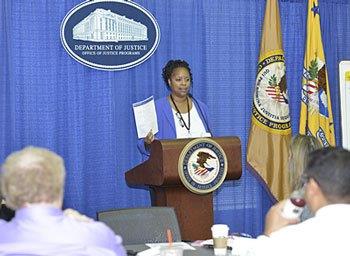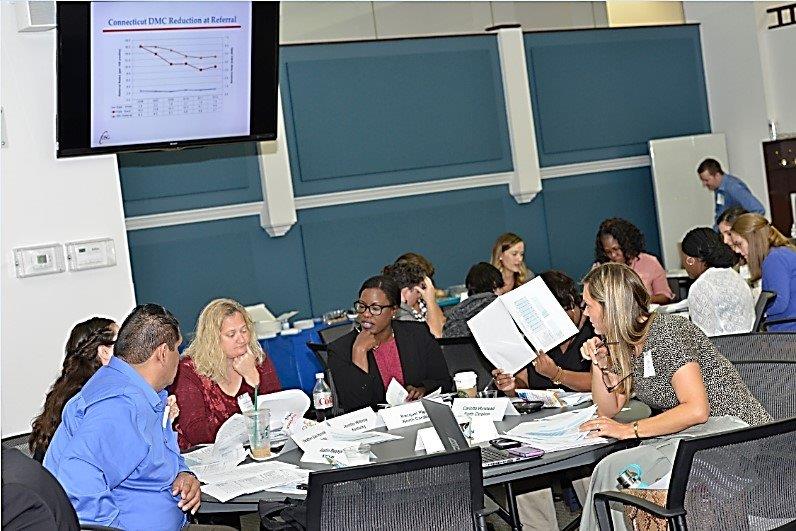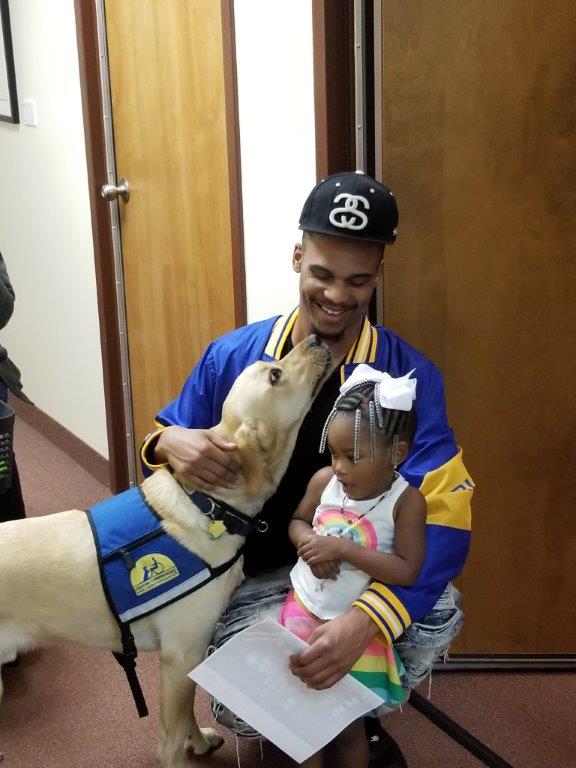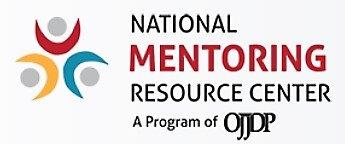
 Tina Borner, Senior OJJDP Compliance Analyst, addresses the attendees. OJJDP designed the trainings, which took place in Washington, DC, on September 12–15, 2017, to support state compliance with the core requirements of the Juvenile Justice and Delinquency Prevention Act.
Tina Borner, Senior OJJDP Compliance Analyst, addresses the attendees. OJJDP designed the trainings, which took place in Washington, DC, on September 12–15, 2017, to support state compliance with the core requirements of the Juvenile Justice and Delinquency Prevention Act. SAG New Member Training
The 56 State Advisory Groups are responsible for participating in the development and review of their state’s juvenile justice plan; reviewing and commenting on applications for subgrants; advising the designated state agency, chief executive, and state legislature on their states’ compliance with the requirements of the JJDP Act; and obtaining regular input from youth currently under justice system jurisdiction.
On September 12, Chyrl Jones, Deputy Administrator, opened the SAG training session. She welcomed participants and provided an overview of OJJDP’s partnership with the states to address the JJDP Act’s four core requirements: deinstitutionalization of status offenders (DSO), removal of youth from adult jails and detention facilities, prohibition of sight or sound contact of juveniles with adult inmates, and a reduction in the disproportionate number of minority youth who come into contact with the juvenile justice system. Deputy Administrator Jones then introduced OJJDP Acting Administrator Eileen M. Garry, who discussed the important role of SAG members and her commitment to continuing to strengthen OJJDP’s partnership with the states. Acting Administrator Garry also offered examples of effective and innovative work that states are undertaking.
Robin Delany-Shabazz, Associate Administrator of OJJDP’s State and Community Development (SCD) Division, spoke about the history of the JJDP Act, OJJDP’s mission, and how the Office’s SCD and Core Protections Divisions help the states achieve compliance with the core requirements. SCD administers the Formula Grants program, which supports state and local delinquency prevention and intervention efforts and juvenile justice system improvements. The Core Protections Division conducts audits to assess compliance monitoring system adequacy, makes annual determinations of compliance with the core requirements, and coordinates with OJJDP staff and training and technical assistance providers to ensure that states receive the necessary assistance.
In a session titled “Working Together for Our Children,” OJJDP Program Manager Karen Bachar and Utah SAG Chair Pam Vickery led a discussion on the roles and responsibilities of SAG members. Among other responsibilities, SAG members must participate in the development of a 3-year strategic plan to qualify for Formula Grants funding, submit annual recommendations to the Governor and state legislature, and seek regular input from youth under juvenile justice jurisdiction. The discussion emphasized the importance of the SAG Chair and the Juvenile Justice Specialist in each state working together closely to identify gaps, needs, and goals.
Other topics covered in the training included the importance of data collection and analysis, an overview of the 3-year plan and formula grants application process, and strategies for engaging youth. Ms. Bachar and Ms. Vickery also joined Naomi Smoot, Executive Director of the Coalition for Juvenile Justice, to discuss how SAG members can be active, effective juvenile justice leaders in their states.
DMC Coordinator Training
Disproportionate minority contact coordinators are responsible for facilitating their states’ compliance with the DMC core requirement through comprehensive DMC-related data collection, reviews of statewide initiatives, and dissemination of information. OJJDP’s September 13 training included the following information—
- An overview of DMC and racial and ethnic disparities, including the core DMC requirement.
- The roles and responsibilities of key stakeholders.
- OJJDP’s five-phase DMC Reduction Model, which helps states determine whether disproportionality exists within their jurisdictions and, if it does, provides a step-by-step model to guide their DMC reduction efforts.
Compliance Monitor Training 
Compliance monitors are responsible for supporting their states’ compliance with other core requirements of the JJDP Act—deinstitutionalization of status offenders, sight and sound separation, and jail and lockup removal. On September 14–15, OJJDP Senior Advisor Greg Thompson and Senior Compliance Analyst Julie Herr reviewed new regulatory guidance and provided an overview of the following requirements:
- Deinstitutionalization of status offenders: The definition of a status offender (a status offender is a juvenile who has been charged with, or adjudicated for, conduct that would not be a crime if committed by an adult); examples of status offenses (e.g., running away, curfew Representatives from more than 50 U.S. states and territories participated in the in-person and webinar-facilitated trainings. The collaborative, peer-to-peer learning environment of the trainings allowed the more experienced attendees to share lessons learned with their newer counterparts. violations, truancy); and exceptions to the DSO requirement, including the valid court order.
- Sight and sound separation: An explanation of sight separation (prohibiting clear visual contact between adult inmates and juveniles) and sound separation (prohibiting direct oral communication between adult inmates and juvenile offenders).
- Jail and lockup removal: A description of this requirement (that no juvenile will be detained or confined in any jail or lockup for adults) and the four exceptions to the requirement (the 6-hour, rural, travel conditions, and conditions of safety exceptions).
OJJDP staff also discussed the statutory language surrounding the detention and confinement of youth, provided an overview of the compliance determination process, and explained how the Core Protections Division uses the Compliance Determination Assessment Form to inform the compliance determination this process.
“OJJDP is committed to strengthening its relationship with states, and we hope this training offered valuable information to support compliance with the requirements of the JJDP Act,” said OJJDP Acting Administrator Eileen M. Garry. “The Office has a wealth of resources to assist in this effort.”
Resources:
More information on compliance with the JJDP Act and the Formula Grants program is available on the Office’s website. Contact information for the juvenile justice specialists, DMC coordinators, and SAG chairs in each state may also be accessed on the OJJDP website.
To read a 2017 state-by-state summary of juvenile justice initiatives, visit the website of the Federal Advisory Committee on Juvenile Justice.
The OJJDP-sponsored National Survey of Children’s Exposure to Violence found that nearly 60 percent of children in the United States experience or witness violence, crime, or abuse at home, in school, or in their communities. These traumas can impact children’s brain development and possibly lead to lifelong health and social consequences.
The Department of Justice (DOJ) has worked to address children’s exposure to violence in larger cities and tribal communities for many years. October marks the 1-year anniversary of DOJ's launch of the Changing Minds campaign. OJJDP supported the development of this national public education campaign to raise awareness about the urgency and prevalence of childhood trauma, change perspectives about the impact of children’s exposure to violence, and motivate adults who regularly interact with children and youth to take action and help. OJJDP initially provided $2 million in fiscal year 2015 funding to develop and launch the campaign.
The Back Story
Changing Minds was previewed in June 2016 during the National Summit on Preventing Youth Violence and formally launched by DOJ on October 19, 2016. OJJDP partnered with Futures Without Violence, the Ad Council, and Wunderman to create Changing Minds in response to a recommendation in the Report of the Attorney General’s National Task Force on Children Exposed to Violence calling for “a national public awareness campaign to create fundamental changes in perspectives in every organization, community, and household.” The campaign teaches the science of childhood trauma and how actions taken by caring adults in children’s lives can have healing and positive effects.
Tools and Resources
The campaign website, changingmindsNOW.org, includes two original videos depicting the personal stories of adults who, as children, were exposed to violence in their homes and communities, and reunions with the adults who helped them. The videos, “Chad” and “Unique,” dramatize how consistent relationships with caring adults can positively impact the lives of traumatized children. Another video, “Reshape the Brain,” explores the science behind the impact of violence on children’s brain development.
The website also offers child-serving professionals and caregivers five specific everyday gestures to celebrate, comfort, collaborate with, listen to, and inspire children and young people to help them overcome their trauma.
Other Changing Minds resources include presentations on resilience, the effects of early life stress, brain power, and building better brains; a toolkit containing campaign videos, posters, and background information; and a curriculum for the Changing Minds Institute, which helps communities strategize how to enhance resiliency and healing for children and youth.
Efforts and Results
In addition to funding, developing, and administering the campaign, OJJDP works with Futures Without Violence to publicize it. Efforts have included creating and circulating resource material, incorporating information in numerous events, such as the National Council of Juvenile and Family Court Judges’ Annual Juvenile Justice Conference, spreading the campaign’s message via various social media outlets, and partnering with more than 30 national organizations to conduct additional outreach and promotion.
The campaign’s digital content has been recognized nationally. The Chad and Unique videos recently won awards for cinematography and video editing from the American Advertising Awards, film direction and cinematography from the Cannes Lions, and film technique (direction) from the Clio Awards. “Reshape the Brain” received a 2017 American Advertising Award for Animation, Special Effects, and Motion Graphics.
OJJDP recently allocated nearly $800,000 in fiscal year 2017 funds for Changing Minds. These funds will be used to develop new campaign tools and materials, expand the campaign’s learning communities, assess the campaign’s impact, and disseminate best practices and lessons learned.
Resources:
Access publications in the National Survey of Children’s Exposure to Violence series on the OJJDP website.
The U.S. Department of Justice (DOJ) held the first National Public Safety Partnership (PSP) Summit on September 11–13, 2017, in New Orleans, LA. Established in June, PSP is a DOJ-wide program that enables cities to consult with and receive coordinated training and technical assistance and an array of resources to enhance local violence-reduction strategies.
At the summit, DOJ officials, executive leaders and key stakeholders from PSP sites, and violence-reduction experts discussed evidence-based programs and practices to increase public safety, reduce violence, and enhance partnerships in the participating communities. Acting Assistant Attorney General Alan R. Hanson welcomed the participants and highlighted the Department of Justice’s focus, through the Public Safety Partnership, to help communities expand their capacity to fight serious violent crime. “PSP relies on data and evidence and taps federal and local expertise to design crime-fighting strategies,” he said. “Its objective is to marshal resources from participating agencies, to share knowledge, and to make sure communities have what they need to meet the pressing challenges they face.”
Presentation topics included law enforcement partnerships at the federal level, transforming the policing culture to foster public safety, increasing public trust, advancing technology in crime-fighting efforts, leveraging local partnerships, establishing PSP peer networks for information sharing, and police foundations as law enforcement partners.
The summit brought together more than 350 civic leaders, law enforcement executives, criminal justice professionals, researchers, and advocates to focus on crime reduction in our nation’s cities. The summit provided an opportunity for PSP sites across the country to network and share with the four new sites—Birmingham, Indianapolis, Memphis, and Toledo—lessons learned in investigating and prosecuting violent criminals, especially those involved in gun crime, drug trafficking, and gang violence. Associate Attorney General Rachel Brand addressed the audience and reinforced the Department’s commitment to work with state, local, and tribal law enforcement agencies to root out violence in their communities.
PSP was established under the direction of Attorney General Jeff Sessions in response to President Trump’s Executive Order on a Task Force on Crime Reduction and Public Safety, which emphasizes DOJ’s role in combating violent crime. The task force is composed of leaders from across DOJ, including the heads of the FBI; Bureau of Alcohol, Tobacco, Firearms and Explosives; Drug Enforcement Administration; and U.S. Marshals Service. PSP currently provides 27 cities of different sizes and diverse needs with data-driven, evidence-based strategies for reducing violent crime.
OJJDP Senior Policy Advisor Cynthia Pappas joined other officials from DOJ program offices—the Bureau of Justice Assistance (BJA), the Office of Community Oriented Policing Services, the Office for Victims of Crime, and the Office on Violence Against Women—to provide an overview of how DOJ programs, publications, and training and technical assistance can support PSP sites as they engage in violence-reduction efforts.
Ms. Pappas discussed the specific opportunities and resources available through OJJDP to help these communities build their capacity to effectively address youth violence, including an award to the International Association of Chiefs of Police, in partnership with the Yale Childhood Violent Trauma Center, to increase the understanding of children exposed to violence among law enforcement leaders and officers. Ms. Pappas also highlighted the work of the BJA- and OJJDP-sponsored National Gang Center and resources available through OJJDP's one-stop technical assistance site, TTA360.
Resource:
More information about PSP is available on its website.
On August 27–30, 2017, the American Probation and Parole Association (APPA) held its 42nd Annual Training Institute in New York, NY. The institute included several sessions featuring OJJDP-funded initiatives.
OJJDP supports targeted training and technical assistance efforts to help states implement recently enacted legislation requiring changes across multiple juvenile justice system components. Kentucky was one of the original states to receive funding in 2014 for this purpose. In the workshop, “Kentucky’s Juvenile Justice Reform: An Overview of Implementation and Evaluation Efforts,” OJJDP social science analyst Benjamin Adams provided a summary of the Office’s system improvement efforts. Mr. Adams was joined by staff from APPA, the Crime and Justice Institute, and Westat, who introduced the key components of Kentucky’s legislative improvements, discussed early successes and challenges in implementation, and described the study design plan for a forthcoming evaluation.
Many juvenile justice agencies struggle to consistently collect, analyze, and apply information to their practices in the face of scarce research budgets and inconsistent data systems. During the session, “A Blueprint to Better Data: Panel of Model Data Project Pilot Sites,” staff from OJJDP, APPA, and the National Center for Juvenile Justice provided an overview of OJJDP’s Juvenile Justice Model Data Project. They were joined by representatives from Model Data Project pilot sites in Bannock County, ID, and Davidson County, TN. OJJDP's Model Data Project aims to enhance the quality and consistency of juvenile justice information and to increase its appropriate use in policy and practice decisions by providing guidance to states and jurisdictions on data improvements. Representatives from the pilot sites shared their experiences, provided examples of how their data capacity was assessed, and identified practical opportunities for data improvements.
OJJDP-funded work by the New York State Division of Criminal Justice Services and Kids Oneida was highlighted in the session, “Second Chances: Improving Community Supervision and Reentry in the Juvenile Justice System.” The presentation provided information on efforts to strengthen community supervision and improve outcomes in counties across upstate New York that are receiving support and technical assistance through OJJDP’s Second Chance Act Community Supervision Implementation program. It also introduced strategies to engage families in the community supervision process as methods of successfully transitioning youth back home following placement.
Funded by a grant from OJJDP, the Urban Institute conducted a focus group on community supervision and youth development. The objective was to gather information from practitioner participants at the conference to inform efforts to translate research on adolescent development and effective interventions with youth into practical guidance for probation agencies. The Urban Institute is leading OJJDP’s Bridging Research and Practice Project To Advance Juvenile Justice and Safety to create practitioner-friendly products that can apply developmental approach principles to youth supervision, guide improvement efforts at the agency and administrative levels, and establish effective methods of disseminating findings and products to youth supervision agencies.
Resources:
For additional information on reentry resources, see Behavioral Health Problems, Treatment, and Outcomes in Serious Youthful Offenders. For additional information on improvements in the juvenile justice system, see the publication, Improving Outcomes for Youth: A Look at Juvenile Justice Reform Implementation in Six States.
By Dana Watson
 Darius, a Strengthening Fathers program participant, attends a postservices case management appointment for followup care. He was accompanied by his daughter, who was excited to see the center's service dog, Agent.
Darius, a Strengthening Fathers program participant, attends a postservices case management appointment for followup care. He was accompanied by his daughter, who was excited to see the center's service dog, Agent.
Photo courtesy of The Up Center.
The center is a recipient of OJJDP’s fiscal year 2016 Second Chance Act Strengthening Relationships Between Young Fathers, Young Mothers, and Their Children grant. The initiative supports efforts to improve outcomes for young parents returning from detention, out-of-home placement, or incarceration. It also aims to reduce recidivism and promote public safety.
With the help of the OJJDP grant, The Up Center is now able to provide prerelease and postrelease services to young fathers, helping to guide them and change their way of thinking as they reenter society. Through our Strengthening Fathers program, we provide comprehensive, transitional services to young fathers ages 16 to 24 who have been selected for a prerelease program. The goal of the program is to facilitate reentry by promoting family engagement and healthy relationships.
Participants receive essential services and assistance with case management, child support and child custody issues, parenting classes, job development skills, and mentoring. Services are offered in both group settings and one-on-one sessions. The young men also benefit from referrals to community resources, family reunification assistance, GED assistance and preparation services, transportation assistance, and other support services.
Mentors, also known as life coaches, attend an orientation and are trained to work in the program. There are currently eight mentors in the program who are serving nine participants. Mentors are required to maintain weekly contact with their mentees for 12 weeks, with a continuing commitment to the mentee for 1 year.
Darius D. is pleased with the progress he's made since joining the reentry program. “The Strengthening Fathers program gave me more motivation to do better. I knew that I could be a good father, but the program gave me parenting skills to be a better father,” he said. “The program also helps me show others I am worthy of being given a second chance.”
Similar to most programs, retention can be challenging. The Strengthening Fathers program is currently seeking more participants and more life coaches. By working together to reduce recidivism and promote increased family engagement, we will help end the epidemic of the fatherless child.
Resources:
Learn more about The Up Center.
Visit the OJJDP website to access the Office’s reentry resources and to read about the Initiative to Develop Juvenile Reentry Measurement Standards.
The Office’s Model Programs Guide provides additional information about evidence-based juvenile justice and youth prevention, intervention, and reentry programs.
_________
Dana Watson is a program manager at The Up Center. Points of view or opinions expressed in this article are those of the author and do not necessarily represent the official position or policies of the U.S. Department of Justice.
Medical Training Academy/Legal Training Academy: November 2–4, 2017
This training, hosted by the Southern Regional Children’s Advocacy Center, will be held in Huntsville, AL. It is designed for healthcare providers (physicians, nurse practitioners, sexual assault nurse examiners, and physician assistants) who provide medical evaluations for suspected victims of child abuse as well as prosecutors or child protection attorneys who handle criminal or civil cases of child abuse. Registration information is available online.
Child Homicide Investigations: November 6–7, 2017
The National Criminal Justice Training Center will host this 2-day training in Las Vegas, NV. The training will focus on understanding and building relationships between the forensic pathologist, homicide investigator, and prosecutor to successfully investigate and prosecute child homicide cases. Information will be presented on autopsy protocols, forensic essentials, and the criticality of determining the cause and manner of death. Registration information is available online. 
Exploited Children Seminar for CEOs: November 6–7, 2017
This seminar, hosted by the National Center for Missing & Exploited Children, will take place in Alexandria, VA. Topics include the nature and scope of child exploitation, offender characteristics, investigative responses and challenges, and an overview of child sex trafficking. The course is designed specifically for chiefs and sheriffs. Registration information is available online.
American Evaluation Association 31st Annual Conference: November 6–11, 2017
The American Evaluation Association will conduct this conference in Washington, DC. Evaluation 2017 brings together evaluators, evaluation scholars, students, and evaluation users from around the world to share and learn from the successes of the international discipline and practice of evaluation. Presentations and learning formats include demonstrations, expert lectures, multipaper sessions, panels, roundtables, and skill-building workshops. Registration information is available online.
A Pathway to Wellness: Working at the Intersection of Domestic Violence and Substance Abuse: November 8–9, 2017
The National Criminal Justice Training Center will host this training in Mt. Pleasant, MI. Participants will explore the connection between domestic violence and substance abuse, common cause and effect myths about domestic violence, the impact on families, and the risks to drug-endangered children. They will also examine the need for a collaborative response and implementation of multidisciplinary teams. Registration information is available online.
Digital Evidence Investigations: November 13, 2017
The National Criminal Justice Training Center will host this training in Shawnee, OK. The training is designed to provide the first responder, investigator, and investigative supervisor in child abduction, exploitation, and child sex trafficking cases with information to improve their capacity and capabilities to conduct digital evidence preservation, collection, and analysis. Registration information is available online.
Reducing Racial and Ethnic Disparities in Juvenile Justice Certificate Program: November 14–17, 2017
Hosted by the Center for Juvenile Justice Reform at Georgetown University, this certificate program is an intensive training program designed to support local jurisdictions in their efforts to reduce racial and ethnic disparities in their juvenile justice systems. It will also focus on the relationship between disproportionality in the juvenile justice system and disparate treatment in other child-serving systems, including child welfare and education. Application guidelines are available online.
American Society of Criminology: November 15–18, 2017
The theme for the American Society of Criminology’s (ASC’s) 2017 meeting, to be held in Philadelphia, PA, is “Crime, Legitimacy, and Reform: 50 Years After the President’s Commission.” ASC is the largest professional criminological society in the world and includes practitioners, academicians, and students in the fields of criminal justice and criminology. Session topics include juvenile crime and the justice system, correlates of crime, victimology, policing, and perceptions and responses to crime and justice. Registration information is available online.
Enhancing Tribal and State Collaborations To Build Sustainable Public Safety Partnerships: November 28–29, 2017
This course, hosted by the Wyandotte Tribal & Municipal Police Department and cosponsored by the Bureau of Justice Assistance, is designed to be a proactive, comprehensive, training experience that fosters collaboration among tribal, state, federal, and local governments. The class will train and equip participants with the knowledge and skills necessary to identify existing tribal justice challenges so they can strengthen partnerships to more effectively implement criminal justice initiatives in their organizations. It will be held in Wyandotte, OK. Registration information is available online.
Missing Children Seminar for CEOs: December 4–5, 2017
This seminar, hosted by the National Center for Missing & Exploited Children, will be held in Alexandria, VA. Participants will learn about issues related to missing child cases, including effective policies and practices, technical assistance, training, and available resources. Topics include policies and practices for CEOs, strategy development, and survivor impact. This course is designed for chiefs, sheriffs, 911 directors, and clearinghouse managers. Registration information is available online.
Forensic Interviewing of Children Training: February 5–9, 2018
The National Children's Advocacy Center will host this 5-day training in Huntsville, AL. The training includes audience discussion, a child interview practicum, a review of recorded forensic interviews, experiential skill-building exercises, and participation in a mock court simulation. To facilitate continued skill development, each participant will receive a training manual, a recorded copy of his or her interview practicum, and access to additional online training materials. Registration information is available online.
Developing a Community Response for High-Risk Victims of Child Sex Trafficking and Exploitation: February 7–8, 2018
The National Criminal Justice Training Center will host this training in Raleigh, NC. Participants will learn to construct a multidisciplinary response to high-risk victim cases; quantify the problem of sex trafficking locally; and define the high-risk victim and the correlation and commonalities between the chronic runaway, repeat victims of sexual abuse, and children who are victimized through sex trafficking. Registration information is available online.
OJJDP Welcomes New Associate Administrator for Core Protections Division
 Dr. TeNeane Bradford, Associate Administrator, Core Protections Division.
Dr. TeNeane Bradford, Associate Administrator, Core Protections Division.OJJDP is pleased to welcome Dr. TeNeane Bradford as Associate Administrator of the Core Protections Division (CPD). CPD provides guidance and specialized assistance to the states regarding compliance with the four core requirements of the Juvenile Justice and Delinquency Prevention (JJDP) Act. The division also conducts reviews and field audits to assess how well the states' monitoring systems comply with the JJDP Act.
Dr. Bradford comes to OJJDP from the Office of Community Oriented Policing Services (COPS Office), where she served as senior supervisory policy analyst in the Grants Administration Division and for a year as the division’s Acting Assistant Director. Prior to her managerial role, Dr. Bradford served as a Lead Grant Monitoring Specialist at the COPS Office and has a significant background in compliance.
From 2003 to 2009, Dr. Bradford served as the State Reentry Director and Intensive Supervision State Coordinator for the South Carolina Department of Juvenile Justice, where she managed the Serious and Violent Reentry Initiative that was funded through the U.S. Department of Justice. She also has experience working on disproportionate minority contact issues.
Dr. Bradford holds a master’s degree in Management and Human Resource Development from Webster University and a doctorate in Public Service Leadership with an emphasis in Criminal Justice from Capella University.
“I am excited to steward the team and be a part of ensuring that states comply—and are empowered to comply—with the JJDP Act,” Dr. Bradford said. “I am looking forward to building relationships and further cementing the significance and purpose of the Core Protections Division.”
OJJDP Acting Administrator Blogs on Keeping Children Safe Online
OJJDP Acting Administrator Eileen M. Garry recently blogged on the importance of safeguarding youth online. Bureau of Justice Statistics research shows that 21 percent of 12–18 year-old students experienced bullying in 2015 and approximately 16 percent of high school students experience some form of electronic bullying. Youth who have been bullied report negative impacts on school, relationships, mental health, and physical well-being.
Acting Administrator Garry notes that October, National Cyber Security Awareness Month, presents a special opportunity to educate children on how to identify dangerous situations online and how to properly respond.
“When they are online, children and teenagers are particularly vulnerable to criminal acts because they are often naive, curious, and eager for attention,” writes Ms. Garry. “Through online resources, research, grant funding, and additional training programs, OJJDP continues to support law enforcement and parents as they seek to keep children safe online.”
Ms. Garry notes the work of the OJJDP-sponsored Internet Crimes Against Children Task Force and highlights resources from the OJJDP-supported Stopbullying.gov and NetSmartz.org that teach children and parents how to identify and address cyberbullying.
Read the blog post, “Keeping Our Children Safe Online.”
The bulletin, The Role of Technology in Youth Harassment Victimization, examines technology-involved harassment in the context of other types of youth victimization and risk factors. Access the bulletin on the OJJDP website.
OJJDP Launches Tribal Youth Training and Technical Assistance Center Website
OJJDP’s Tribal Youth Training and Technical Assistance Center has launched its new website. The center’s goal is to help tribes build capacity to develop, expand, improve, and maintain their juvenile justice systems.
The website serves as a clearinghouse of culturally appropriate resources, training, and technical assistance and provides information in areas, such as juvenile healing to wellness courts; tribal youth-specific prevention, intervention, and treatment programming; and tribal-state collaborations to meet the needs of American Indian and Alaska Native children exposed to violence.
Visit OJJDP’s Tribal Youth Training and Technical Assistance Center website and learn more about OJJDP's tribal youth programs and services.
OJJDP-Funded Brief Helps Judges Use Data To Improve Their Courtrooms and Youth Outcomes
With support from OJJDP, the National Center for Juvenile Justice has published 5 Ways Juvenile Court Judges Can Use Data. The brief provides examples of how juvenile court judges can use data to learn more about their courtroom practices and the jurisdictions they serve. This publication is the first in a series that will include briefs for law enforcement and corrections administrators.
Developed through the OJJDP-funded Juvenile Justice Model Data Project, this effort seeks to improve the quality and consistency of juvenile justice data through developing guidance for states and jurisdictions on how to collect, analyze, and use juvenile justice data.
View and download the brief.
Statistical Briefing Book Updates Juvenile Residential Placement and Juvenile Homicide Data
OJJDP’s Statistical Briefing Book has been updated. Developed for OJJDP by the National Center for Juvenile Justice, the research division of the National Council of Juvenile and Family Court Judges, the Statistical Briefing Book provides easy online access to statistics on a variety of juvenile justice topics. The updates include answers to new frequently asked questions (FAQs) describing racial and ethnic fairness in the special topics section. Additional FAQs were updated in several areas, including a description of the number and characteristics of child maltreatment victims and trends in school crime victimization. The data analysis tool for Easy Access to FBI Arrest Statistics has been updated to include county-level arrest estimates through 2014.
National Gang Center Redesigns Website
The National Gang Center (NGC) has launched its redesigned website. The new website’s focus areas are criminal justice, safe communities, and research. There is an inquiries section for quicker responses from staff and new forms to request technical assistance, consultations, and training. The website also includes the NGC blog, which features blog posts on topics, such as responding to gangs in schools and using social media for gang investigations. Users can also access the OJJDP Comprehensive Gang Model, which is designed to help community efforts to combat gang activity. It includes tools for identifying appropriate target areas and groups to focus resources on.
Jointly funded by OJJDP and the Bureau of Justice Assistance, the National Gang Center works to reduce gang-related crime and violence by delivering resources, training, and technical assistance to practitioners nationwide.
National Mentoring Resource Center Tools Strengthen Match Support and Closure
The OJJDP-sponsored National Mentoring Resource Center has released a suite of tools to help mentors and mentees thrive through enhanced support of matches and a successful closure process. These tools include resources on how to clarify expectations to avoid mentoring match challenges; estimate staffing hours needed to make, support, and close matches; and examine the health of a match.
Download the full suite of tools and sign up to receive monthy updates about new tools, resources, and learning opportunities.
October Is National Bullying Prevention Month
![]() Every October, communities across the country recognize National Bullying Prevention Month through events, activities, and outreach intended to raise awareness about the prevalence of bullying and its impact on youth.
Every October, communities across the country recognize National Bullying Prevention Month through events, activities, and outreach intended to raise awareness about the prevalence of bullying and its impact on youth.
OJJDP’s School-Based Bullying Prevention Implementation Guide (I-Guide) is a research-based resource that assists school personnel, parents, and youth-serving practitioners with creating safe school environments. The I-Guide provides information on needs assessment tools, ways to analyze the problem, evidence-based programs to prevent and intervene in bullying, and guidance on gaining support for prevention program implementation. There is also a literature review and additional information about bullying prevention programs on OJJDP's Model Programs Guide website.
OJJDP is a member of the Federal Partners in Bullying Prevention, an interagency effort that coordinates policy, research, and communications on bullying topics. To learn more about bullying prevention and to access helpful resources, visit StopBullying.gov.